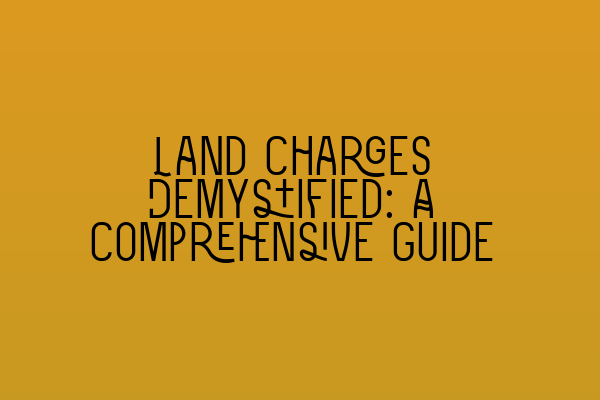Land Charges Demystified: A Comprehensive Guide
When it comes to property law, understanding the various types of land charges is essential. Whether you are a solicitor specializing in property law or a property owner looking to buy or sell, having a comprehensive understanding of land charges is crucial to navigating the legal landscape.
What are Land Charges?
Land charges are detrimental interests or rights that affect a property. These charges are registered against the property title and can restrict the owner’s ability to use or sell the property. Land charges can be created by various parties, including lenders, government bodies, or individuals with a legal interest in the property.
Land charges are usually registered with the Land Charges Department of the Land Registry. However, some charges, such as local land charges, may be registered with the local authority.
Types of Land Charges
1. Mortgages: Mortgages are a common type of land charge. When a property owner borrows money from a lender to purchase a property, the lender registers a mortgage charge against the property. This charge gives the lender the right to repossess and sell the property if the borrower defaults on the loan.
2. Restrictive Covenants: Restrictive covenants are contractual agreements that impose restrictions on how a property can be used. These restrictions may include limitations on property alterations, noise levels, or the type of business that can operate on the premises. Restrictive covenants are usually registered against the property and can be enforced by the party benefiting from the covenant.
3. Easements: Easements are rights that allow a person to use another person’s property for a specific purpose. Common examples of easements include rights of way, drainage rights, and rights to access utility services. Easements can be registered against the property and are often established through a formal legal process.
4. Planning Obligations: Planning obligations, also known as Section 106 Agreements, are legal obligations imposed on property owners as a condition of planning permission. These obligations can require the owner to provide affordable housing, contribute to infrastructure projects, or adhere to specific development guidelines. Planning obligations are registered against the property and can be enforced by the local planning authority.
5. Notices: Notices are land charges that serve as warnings or notifications to potential buyers or lenders. These notices alert interested parties to issues or claims that may affect the property. Notices can include bankruptcy notices, matrimonial home rights notices, or notices of pending legal actions.
Effect of Land Charges
Land charges can have significant implications for property owners and buyers. These charges can limit the owner’s rights and affect the property’s value. When considering purchasing a property, it is crucial to conduct thorough due diligence to uncover any existing land charges. An experienced property solicitor can assist in identifying and understanding the implications of these charges.
Failure to address land charges properly can lead to costly legal disputes. It is essential to seek professional legal advice to ensure compliance with all land charge requirements and to protect your interests.
Conclusion
Understanding land charges is a fundamental aspect of property law. Whether you are a solicitor or a property owner, being well-versed in the various types of land charges and their implications is vital. Take the time to familiarize yourself with the different charges and seek legal advice when needed to navigate the complex world of land charges.
For more information on related topics, check out these articles:
